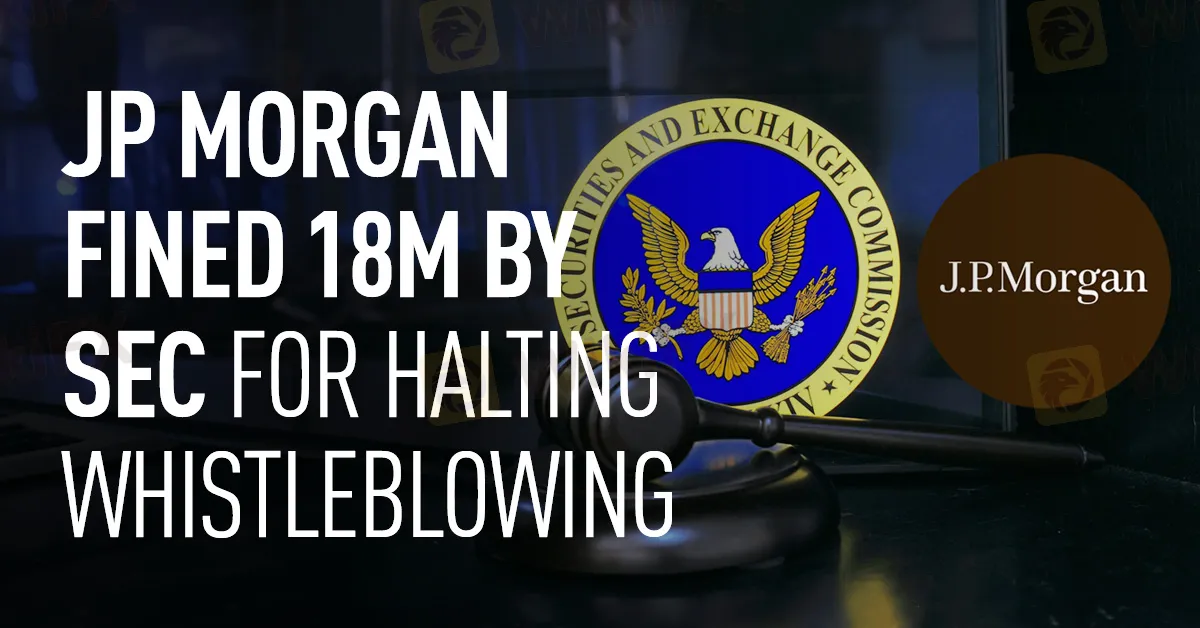简体中文
繁體中文
English
Pусский
日本語
ภาษาไทย
Tiếng Việt
Bahasa Indonesia
Español
हिन्दी
Filippiiniläinen
Français
Deutsch
Português
Türkçe
한국어
العربية
JP Morgan Fined 18M by SEC for Halting Whistleblowing
Abstract:JP Morgan Securities settles SEC charges of obstructing clients from reporting securities law violations, agreeing to an $18 million penalty for requesting confidentiality agreements from clients receiving settlements exceeding $1,000.

On Tuesday, the Securities and Exchange Commission (SEC) made an announcement regarding JP Morgan Securities LLC (JPMS), revealing the settlement of charges related to obstructing advisory clients and brokerage customers from reporting potential securities law violations. As part of this resolution, JPMS has agreed to pay an $18 million civil penalty.
The SEC's order outlines that JPMS was involved in the practice of requesting retail clients to sign confidential release agreements between March 2020 and July 2023. These agreements were presented to clients who had received credits or settlements from the firm exceeding $1,000. The terms of these agreements obligated clients to maintain confidentiality regarding the settlement, underlying facts, and information related to the specific account. Notably, while clients were allowed to respond to SEC inquiries, they were expressly prohibited from voluntarily contacting the SEC.

Gurbir S. Grewal, the SEC's Director of Enforcement, underscored the illegality of including provisions that impede individuals from reporting wrongdoing to the SEC. Grewal expressed concern that the practice, spanning several years, presented clients with the difficult choice of receiving settlements or credits from the firm while refraining from reporting potential securities law violations to the SEC. This situation, according to Grewal, not only undermined critical investor protections but was also deemed illegal.
Corey Schuster, Co-Chief of the Enforcement Divisions Asset Management Unit, emphasized the significance of ensuring that confidentiality agreements do not obstruct potential whistleblowers. Schuster stressed the importance of investors, whether retail or otherwise, being free to report complaints to the SEC without encountering any interference.
The SEC's order found JPMS in violation of the Rule under the Securities Exchange Act of 1934, a whistleblower protection rule prohibiting actions hindering individuals from communicating directly with SEC staff about potential securities law violations. Without admitting or denying the findings, JPMS has agreed to be censured, cease and desist from violating the whistleblower protection rule, and pay the $18 million civil penalty.
In 2022, the SEC took action against and reached settlements with J.P. Morgan Securities, UBS Financial Services, and TradeStation Securities for deficiencies in their identity theft prevention programs. These broker-dealers, without admitting guilt, allegedly violated the Identity Theft Red Flags Rule. Under cease-and-desist orders, JP Morgan faces a $1.2 million penalty, UBS $925,000, and TradeStation $425,000. The SEC highlighted shortcomings in oversight, staff training, and program updates, underscoring the need for enhanced customer protection.

Disclaimer:
The views in this article only represent the author's personal views, and do not constitute investment advice on this platform. This platform does not guarantee the accuracy, completeness and timeliness of the information in the article, and will not be liable for any loss caused by the use of or reliance on the information in the article.
Read more

SEC Ends Crypto.com Probe, No Action Taken by Regulator
The SEC has closed its investigation into Crypto.com with no action taken. Crypto.com celebrates regulatory clarity and renewed momentum for the crypto industry.

Interactive Brokers Expands Crypto Trading with Solana, XRP, Cardano, and Dogecoin
Interactive Brokers adds Solana, XRP, Cardano, and Dogecoin to its platform, enabling U.S. and U.K. clients to trade crypto 24/7 with low fees.

Fidelity Investments Explores Stablecoin Innovation in Digital Assets Sector
Fidelity Investments tests a stablecoin, joining major financial firms in the booming crypto sector. Discover how this impacts digital payments and blockchain adoption.

Hantec Markets Launches InsightPro: AI-Powered Real-Time Trading Signal Tool for Traders
Hantec Markets introduces InsightPro, an AI-powered trading tool offering real-time market insights, signals, and analysis for better trading success.
WikiFX Broker
Latest News
Why Are Financial Firms Adopting Stablecoins to Enhance Services and Stability?
Experienced Forex Traders Usually Do This Before Making a Lot of Money
Octa vs XM:Face-Off: A Detailed Comparison
When High Returns Go Wrong: How a Finance Manager Lost RM364,000
Bridging Trust, Exploring Best—WikiEXPO Hong Kong 2025 Wraps Up Spectacularly
Fidelity Investments Explores Stablecoin Innovation in Digital Assets Sector
Interactive Brokers Expands Crypto Trading with Solana, XRP, Cardano, and Dogecoin
SEC Ends Crypto.com Probe, No Action Taken by Regulator
Why More People Are Trading Online Today?
Gold Surges to New Highs – Is It Time to Buy?
Currency Calculator







